
This article was updated on March 10th, 2024
Unfortunately, unpleasant odors are something most pet owners are familiar with. While most of these are resolved by a thorough bath, what do you do if that doggy smell continues to linger?
As a veterinarian, I frequently encounter less than fragrant dogs, and often use these odors to assist when making diagnoses. In this article I’ll review a few of the common causes of persistent bad dog smells, including what you can look out for at home and when it might be time to visit a vet.
So, why does my dog still smell?
First, you’ll need to establish which part of your dog smells. Unfortunately, this often involves getting more up close and personal with the odor than you might like!
It’s helpful to try to work out whether it’s coming from the mouth, ears, skin or back end as these are all commonly affected areas with different potential causes. Once you’ve done this, check out our list of common causes below, including dental disease, ear and skin infections, anal gland issues and more.
Top reasons for bad dog smell after a bath
1. Ear disease
Chronic ear disease is one of the most common conditions I see causing persistent unpleasant odors in practice. Many affected dogs present for their annual vaccinations rather than a specific appointment, as their owners are unaware of the problem.
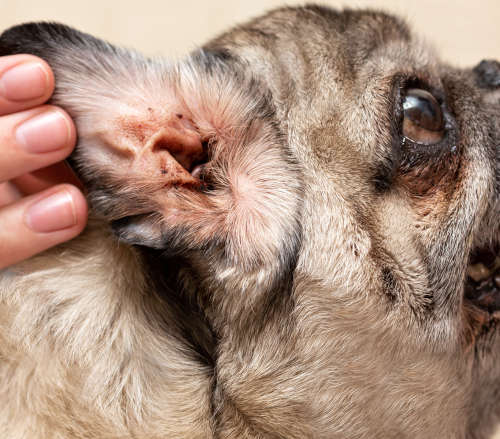
Dogs with ear disease frequently show symptoms like head shaking, scratching their ears and discomfort when their ears are touched; however, for dogs with long-term allergies and ongoing ear issues, these low-level symptoms often go unnoticed.
Yeast ear infections are a particularly common culprit, causing a pungent, cheesy odor in addition to swelling and inflammation of the ear canal and excessive pale wax.
Very mild ear infections can potentially be treated by regular cleaning with a gentle ear cleaner; however, if the ear canal is visibly reddened, swollen or producing significant discharge, your dog is very distressed or it’s not cleared up after a week, it’s worth booking a vet visit. Left unchecked, ear infections can become extremely severe((VIN: https://veterinarypartner.vin.com/default.aspx?pid=19239&id=4951507)).
2. Skin infections & dermatitis
Skin infections are another common cause of malodor. They can be seen alongside ear infections; yeast infections of the paws and other skin folds are commonly seen alongside yeast infections of the ear.
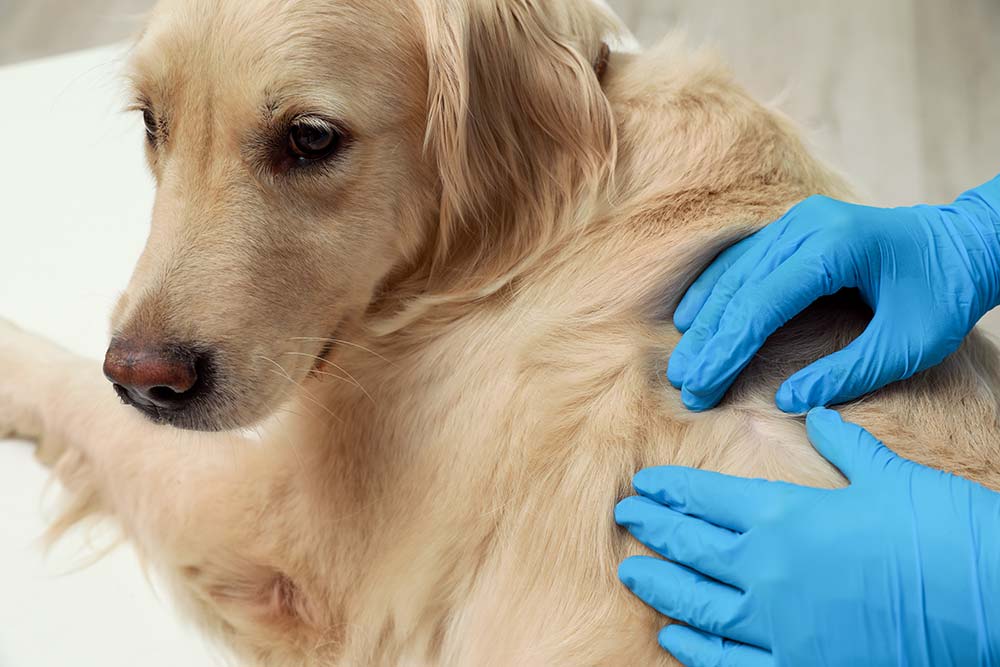
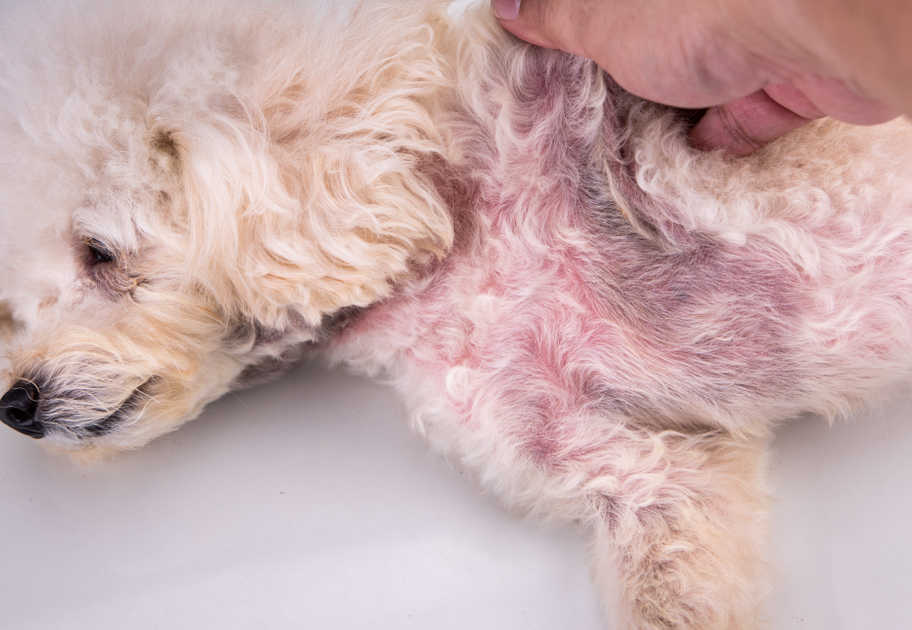
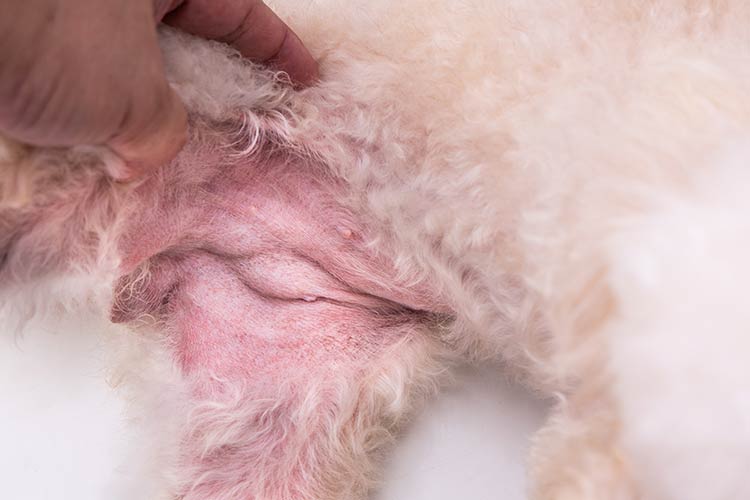
Bacterial infections of skin folds or other areas can also result in pus and unpleasant smells. Common symptoms include:
If you notice a skin infection, it’s best to see a vet sooner rather than later to prevent it spreading. If your dog has underlying allergies or is prone to yeast infections, ongoing treatment may be required to prevent further flareups. This may include systemic medication to reduce itching and inflammation, medicated wipes for daily use or specially formulated shampoos for regular bathing.
Learn more about Skin Infections.
3. Dental disease
Bad breath (halitosis) is often seen as ‘normal’ for dogs but is frequently a sign of underlying dental disease. If it’s severe enough that you’re noticing the smell at home, it’s worth getting your vet to check your dog’s mouth.
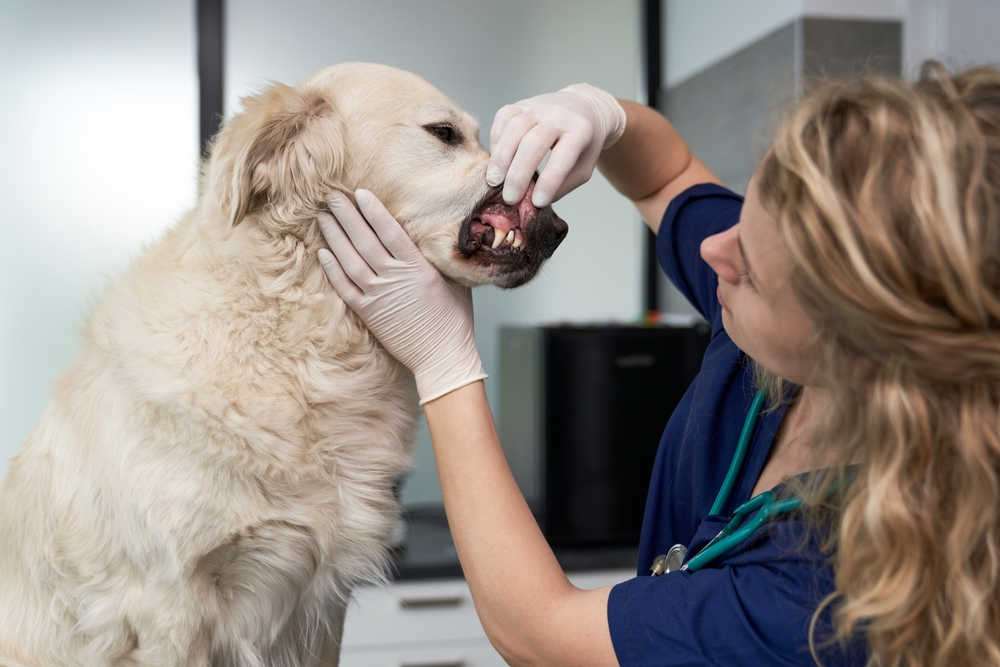
Many dogs suffer from periodontal disease due to accumulated tartar and bacteria, but other conditions like fractured teeth, injuries to the back of the mouth or even a tumor could cause halitosis.
To prevent dental disease, getting your dog used to daily tooth brushing with a pet safe enzymatic toothpaste from a young age is ideal((Watanabe K, Hayashi K, Kijima S, Nonaka C, Yamazoe K. Tooth brushing inhibits oral bacteria in dogs. J Vet Med Sci. 2015;77(10):1323-1325. doi:10.1292/jvms.14-0193)). However, you can start at any age.
It’s worth checking with your vet before starting, because severe dental disease can make brushing painful and will require professional dental cleaning and often tooth extractions before you start with home care. Left unchecked, dental disease can cause severe pain and infection, though dogs rarely show obvious signs.
If brushing isn’t an option, you may want to consider reputable food and water supplements that can help to reduce plaque and bacteria, and chews to help clean your dog’s teeth; while nothing is as good as brushing, these may still help.
4. Anal gland issues
The pungent, metallic, fishy smell of anal gland secretions is usually pretty recognizable. Dogs with overly full anal glands may scoot on the floor, lick their back ends excessively and occasionally release small amounts of this anal gland fluid.
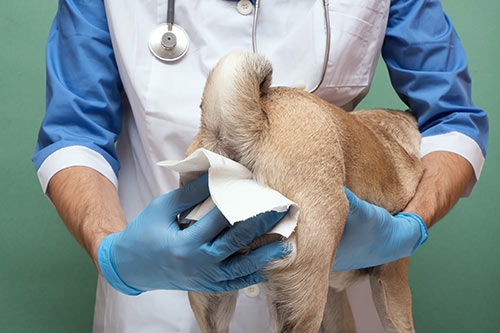
At this stage, they need their anal glands emptying, which is usually done by your vet, vet tech or nurse.
A small number of dogs go on to develop an anal gland infection or abscess, which is intensely painful. These dogs need urgent veterinary attention to get the infection under control.
5. Excessive sebum or seborrhea
Washing your dog too frequently can in some cases lead to dry, irritated skin, and subsequent excess sebum production. The combination of excessive sebum and potentially secondary infections can then lead to odor.
For some dogs, excessive sebum is the result of a condition called seborrhea. This can be a genetic disease or secondary to hormonal imbalances, allergies or other diseases. It can result in a dry, dull coat, dandruff, oily skin, crusty skin lesions and secondary infections1. The whole coat is usually affected, though some areas may be worse than others. The excessively oily coat can cause a persistent doggy smell even after bathing.
If your dog suffers from excessive sebum, it’s worth checking you’re using a high quality, gentle shampoo and not using it excessively. If you suspect your dog may be suffering from seborrhea, it’s worth seeing your vet to try to rule out underlying causes. They can also advise you on appropriate bathing products to help keep your dog’s skin clean and healthy.
6. Flatulence
Though this isn’t usually something that would be described as a persistent smell, some dogs suffer from frequent flatulence throughout the day. If your dog is otherwise healthy, it may be that the diet you’re feeding isn’t well suited to your particular dog’s needs. Try transitioning to an alternative and see if things improve.
7. Other causes
It’s not possible to provide an exhaustive list of unpleasant odors in one article, but there are a few other notable causes to mention.
Depending on your country, your dog may encounter various species of smelly wildlife, or their waste. Skunks, foxes and other animals can produce pungent odors that linger even after bathing, and many dogs seem to enjoy rolling in their feces. The best way to deal with this is extra thorough cleaning; some products are also designed to target these particularly persistent odors. Applying a vinegar and water solution for a few minutes before rinsing may also help.
Occasionally, persistent malodor can be caused by underlying disease, like severe kidney or liver disease. However, this is usually accompanied by a range of other severe symptoms.
Best products to help at home
Virbac’s C.E.T. Oral Hygiene Kit
This is a great option to introduce toothbrushing to your pet. I frequently recommend it to my patients as the enzymatic toothpaste is tasty enough that my own cats will lick it off my fingers. I recommend starting small and only introducing the brush after getting them used to the toothpaste. If you notice your pet’s gums look sore, make sure to get them checked by a vet and avoid causing them pain while brushing.
- Complete kit to start a program of regular oral hygiene for pets
Virbac Epi-Optic Advanced Ear Cleanser For Dogs and Cats
For dogs with recurring ear infections, this ear cleaner is an effective tool to help prevent further flareups. If your dog’s ear is visible inflamed or they’re showing obvious signs of an infection, you should get them checked by a vet before using cleaners.
Veterinary visit or wait-and-see?
If you’ve noticed a pungent odor that isn’t going away for over a week, or is accompanied by other symptoms like discomfort around the ears or back end, it’s worth booking in a vet visit. A bad smell is unlikely to be an emergency, but conditions like ear infections and anal gland abscesses can be painful and worsen relatively quickly.
If you’ve noticed symptoms like pain, visibly inflamed gums or ears, itching and irritation or skin lesions, these are all good indicators that you need to see a vet.
- VIN:https://veterinarypartner.vin.com/default.aspx?pid=19239&id=4951988 [↩]
Disclaimer: This website's content is not a substitute for veterinary care. Always consult with your veterinarian for healthcare decisions. Read More.




Be the first to comment